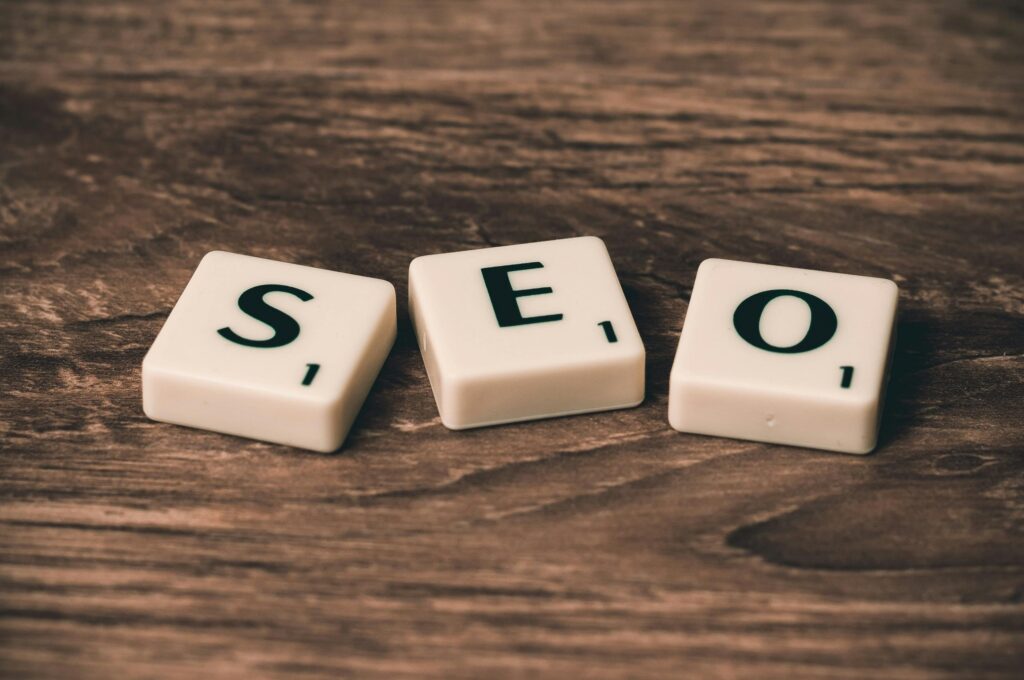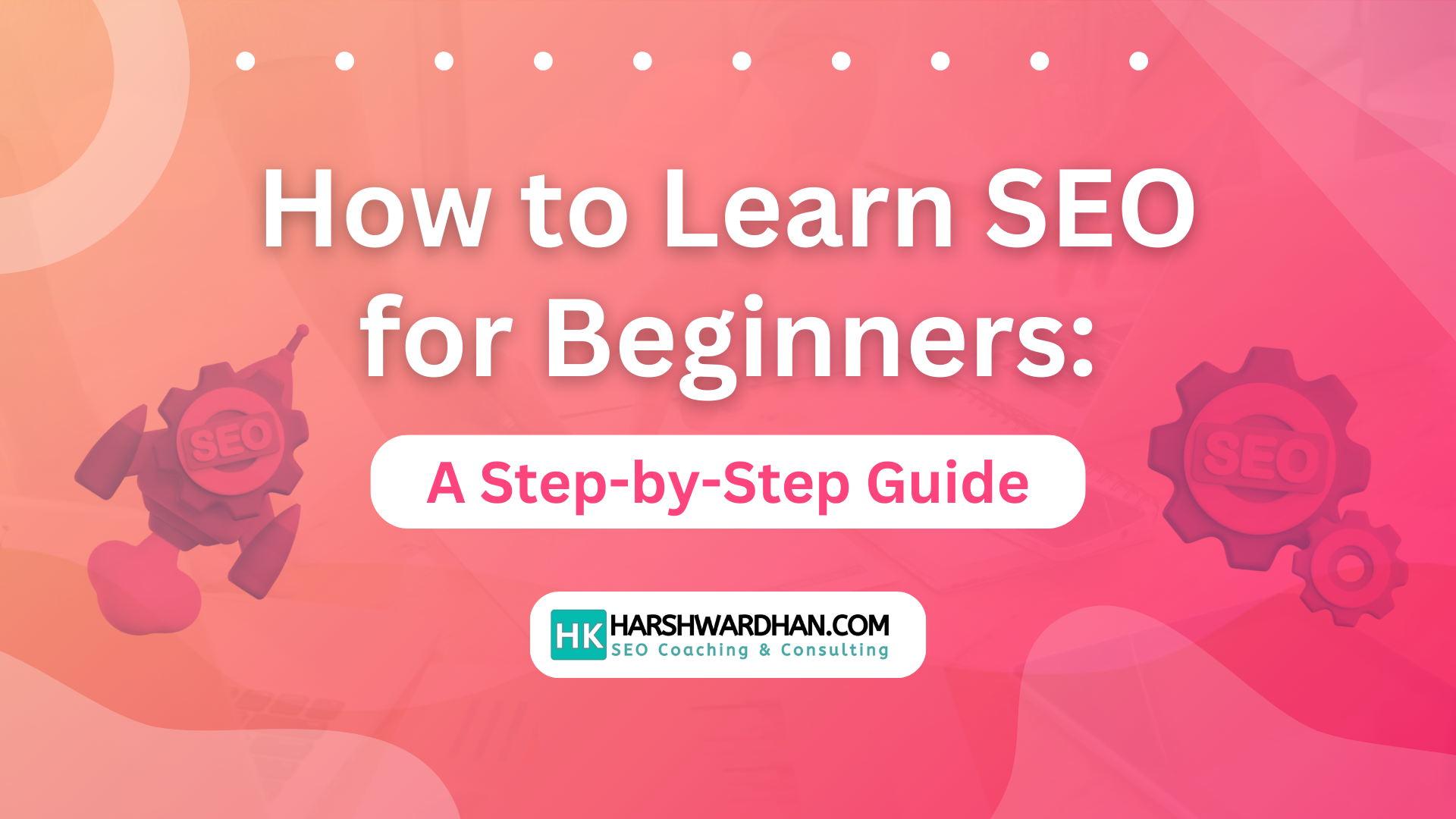
If you’re interested in learning about search engine optimization (SEO) but aren’t sure where to begin, you’re in the right place. You might have heard of basic terms like keyword research, but there’s more to SEO.
This blog will introduce you to essential SEO vocabulary and provide tips on how to learn SEO for beginners on your own. We’ll also go through a step-by-step SEO tutorial to help you start building your SEO strategy.
What You’ll Learn:
- SEO Basics
- How to Learn SEO
- Step-by-step SEO Guide
SEO Basics

Having a basic understanding of SEO concepts and practices is crucial for learning how to get started. But it may take several years of continuous learning and practice to become an SEO expert and understand advanced SEO concepts. Here are some key terms to know:
- Search Engine Optimization (SEO): The strategies used to improve your website so it ranks higher in search engine results for specific keywords, helping people find your content more easily.
- On-page SEO: Adjustments you make directly on your website to enhance search rankings, such as optimizing keywords in your content or refining site structure.
- Off-page SEO: Actions taken outside your website to boost your search engine ranking, like acquiring backlinks from other sites or engaging in guest blogging.
- Link Building: The process of gaining links from high-quality websites to build your site’s authority and credibility.
- SERPs (Search Engine Result Pages): The results pages displayed after a search is conducted, showing the ranking of various pages.
- White-hat SEO: Ethical optimization techniques that adhere to accepted best practices.
- Black-hat SEO: Unethical methods used to manipulate search engine algorithms to achieve higher rankings, which can lead to penalties.
- E-E-A-T: Experience, Expertise, Authoritativeness, and Trust, which are part of Google’s guidelines for evaluating a page’s relevance and authority.
- Keyword: Words or phrases entered into a search engine to find content. Effective use of keywords helps your content show up in related searches.
- Keyword Research: The process of finding keywords that people use when searching for topics related to your business, guiding you on which terms to include in your website and content.
- Organic Results: Search results that appear due to their relevance to the search query, not through payment.
- Organic Traffic: Traffic that comes from organic search results rather than paid advertisements.
- Rank/Page Ranking: Your site’s position in search engine results for specific keywords.
- Ranking Factor: Elements that influence your site’s placement in search results, such as page authority.
- Search Intent: The purpose behind a user’s search query.
These terms are essential for learning how to learn SEO for beginners and understanding the SEO ranking factors that impact your search engine results.
How Search Engines Work

To learn how to do SEO, it’s important to understand how search engines operate. Here’s a simple overview:
First, search engines need to find your page. They use programs called crawlers or bots that follow links from existing pages to discover new ones. This process is known as crawling.
Once a search engine discovers a new page, it examines the content and stores it in a massive database called an index (for example, Google’s index). This step is known as indexing.
Finally, the search engine uses complex algorithms to select and rank the best and most relevant pages from its index to display as search results for user queries. This process is called ranking.
Remember, SEO is an ongoing process. To master how to learn SEO for beginners, you need to continuously adapt and refine your strategies as search engines update their algorithms and practices.
Understanding SEO Ranking Factors

SEO ranking factors are elements that influence how well your website, and its pages perform in search engine results.
For beginners learning SEO, it’s important to know that the most crucial Google ranking factor is the relevance of your page’s content to what users are searching for. This means your content should closely match the user’s query.
Suggested Reads: Why is Content Marketing Important for Your Business in 2024
Google also looks at other factors, such as:
- How quickly your page loads
- How many other websites link to yours
- Whether your page uses the secure HTTPS protocol
Understanding these aspects is key when learning how to learn SEO for beginners, as they all play a role in improving your site’s search engine ranking and SEO success.
Learn SEO Skills
SEO involves multiple areas and needs several specific skills. Here are the most important skills for SEO:
Keyword Research
Keyword research is about finding the search terms (keywords) that people type into search engines. By targeting the right ones, you can benefit your business.
A good keyword research tool helps you analyze:
- Search Volume: The average number of monthly searches for a keyword.
- Keyword Difficulty: How hard it is to rank highly in the search results.
- Search Intent: The reason behind a user’s search (also known as keyword intent).
Learning how to learn SEO for beginners involves understanding these aspects, as they are the foundation of your SEO strategy and critical to becoming an SEO expert. Knowing these elements is also an important Google ranking factor.
SERP Analysis
Evaluating the search engine results page (SERP) for a specific keyword is known as SERP analysis.
It helps you find SEO ranking opportunities and figure out what you need to do to achieve them.
For example, the SERP for “fitness tips” is often filled with articles from well-known health websites that search engines consider trustworthy. This means other types of content or lesser-known sites might find it hard to rank here.
You’ll also see various SERP features (non-standard search results), such as snippets with bullet points or images.
If you were writing an article on fitness tips, you could optimize for these features to aim for more visibility and clicks.
Understanding how to learn SEO for beginners involves mastering these techniques to improve your chances of ranking well.
Content Creation
Creating content is crucial for SEO because it gives search engines material to evaluate and rank.
For the best results, you should:
- Come up with relevant content ideas or blog ideas
- Use content creation tools
- Create quality content tailored to your target audience
- Share your content across various channels
Google aims to rank unique content that shows Experience, Expertise, Authoritativeness, and Trustworthiness (E-E-A-T) to provide helpful and reliable results to users.
This means your content should be accurate, comprehensive, and relevant to your brand. Enhancing your SEO knowledge and learning from popular SEO blogs can help you create better content and apply effective strategies.
On-Page Optimization
On-page optimization is about enhancing the technical and content aspects of your web pages to make them more user-friendly and relevant to your target keywords. This process helps you rank higher in search engines and attract more organic traffic to your site.
Here are the key elements of on-page optimization:
- Title Tags: These are the clickable headlines in search results. They should include your main keyword and a compelling value proposition to entice users to click on your page.
- Meta Descriptions: These are the snippets of text that may appear below the headlines in search results. They should provide a concise summary of your page and include a call to action to encourage users to click.
- Headers: These are the subheadings that structure your content and make it easier to read and scan. They should use relevant keywords and follow a logical hierarchy (H1, H2, H3, etc.).
- Content: This is the main body of your page that provides useful and engaging information to your audience. It should cover your topic in depth, answer searchers’ questions, and use natural language and variations of your keywords.
- Images: These visual elements enhance your page content and appeal to your audience. They should have descriptive alt text that describes the image and includes your keywords when relevant.
- Internal Links: These links connect your pages to each other and help users navigate your site. They should use descriptive anchor text that indicates what the linked page is about.
To effectively perform on-page optimization, use a SEO tool that can analyze your pages at scale and provide actionable insights. This will help you identify areas for improvement and ensure your pages are optimized for better search engine performance.
Technical SEO
Technical SEO is about enhancing various technical elements of your website to ensure search engines can crawl and index it correctly. This includes tasks like:
- XML Sitemap: A file that lists all the pages you want search engines to index.
- Robots.txt File: A file that tells search engines which pages should be crawled.
- Meta Robots Tags: HTML tags that guide search engines on how to crawl, index, and display a particular page.
- Structured Data: Code that helps search engines better understand your content.
Much of technical SEO focuses on improving website performance and the user experience. Important aspects include:
- Mobile-Friendliness: Ensuring your site works well on mobile devices.
- Core Web Vitals: Metrics that evaluate your pages for user experience.
- HTTPS: Ensuring your site is secure.
To make sure your site is optimized, you can conduct a technical SEO audit to identify and prioritize issues. Remember, learning SEO is an ongoing process, and understanding how to learn SEO for beginners will help you grasp how SEO works and improve technical SEO factors on your site.
Types of SEO
There are several main types of SEO that are important for improving your online presence:
On-page SEO
This involves optimizing individual pages to help them rank better. It includes improving content, title tags, and internal links. Understanding how to learn SEO for beginners involves mastering these basic on-page techniques to boost your SEO performance.
Off-page SEO
These are activities done outside of your website to improve its ranking. This includes building backlinks, syndicating content, and managing social media. Good SEO tactics here help increase your site’s authority and relevance.
Technical SEO
This focuses on the technical aspects of your website to ensure it’s optimized for both search engines and users. Key areas include improving page load speed and site structure. Effective technical SEO can significantly enhance your site’s SEO performance.
For specific content formats, you can use:
- Image SEO: Optimizing images so they rank better in both standard and image search results.
- Video SEO: Improving videos to rank higher in search results, including platforms like YouTube.
Additionally, there are SEO tactics tailored for different business types and locations:
- Local SEO: Helps local businesses rank higher in local search results.
- International SEO: For websites targeting multiple languages and regions.
- Ecommerce SEO: For online stores to improve their search rankings.
- SaaS SEO: For software as a service companies.
- Small Business SEO: Focuses on tactics for smaller businesses.
- B2B SEO: Targets business-to-business companies.
By learning these various SEO tactics, you can improve your site’s rankings and SEO performance. Understanding how to learn SEO for beginners and applying these techniques can greatly enhance your online presence and show how SEO can help your business.
Link Building
Link building involves practices to increase the number of links from relevant, high-quality sites to your own.
This is crucial because search engines view these backlinks as signs of your site’s trustworthiness and quality.
The concept is simple:
If many authoritative pages link to a certain page, that page is also considered authoritative. This is why link building has always been a key part of SEO. If you’re looking at how to learn SEO for beginners, understanding link building is essential as SEO is to get your site recognized and improve your website’s authority.
Website Architecture
Website architecture is how your webpages are structured and linked together. It impacts both user experience and overall SEO performance.
A good website architecture should:
- Help users find information easily and navigate your site smoothly
- Enable search engines to crawl and index your site efficiently, understanding page relationships
- Distribute page authority evenly and boost topical authority for target keywords
Understanding this is a key way to learn SEO and apply it effectively.
Search Engine Optimization (SEO) Performance Monitoring
Being able to track and analyze SEO results is a vital skill because it tells you what strategies work best for your business. The goal of SEO learning is to understand which tactics drive success.
It’s a good idea to monitor SEO key performance indicators (KPIs) like:
- Keyword rankings
- Organic traffic
- Organic conversions
Remember, SEO isn’t just about implementing strategies; it’s about continuously assessing and refining them for the best outcomes.
SEO Step-by-Step Tutorial

Step 1: Find Keywords
Step 2: Add Keywords to Page Title
Step 3: Add Keywords to Page URL
Step 4: Include Keywords in Meta Description
Step 5: Use Keywords in H1 Text
Step 6: Add Keywords to Page Content
Step 7: Build Links to Your Site
Step 8: Track Your Rankings
Step #1: Identify Keyword
Keyword research is about selecting words and phrases that are relevant to your business. Think about which words will best encourage people to visit your site and take action, such as filling out a form. Focus on these words.
While using a dedicated keyword research tool can be very useful, beginners can start by choosing keywords intuitively. For example, if you run a bakery, you might choose keywords like “fresh bread,” “artisan bakery,” and “homemade pastries.”
Keep track of these keywords in a spreadsheet or document. For each page of your website, focus on one main keyword and related terms. For instance, if you choose “artisan bakery” as your main keyword, you can also target related terms like “best bakery near me,” “fresh pastries,” and “local bread bakery.”
This approach helps you optimize your website effectively and enhances your SEO efforts.
Step #2: Add Keywords to Page Title
Once you’ve chosen a keyword, it’s time to put it into action. First, include it in your web page’s title.
The page title is one of the most important elements that Google and other search engines evaluate to understand what is on a web page. It appears at the top of your web page’s result in the search engine results pages (SERPs).
For example, if your main keyword is “artisan bakery,” your page title could be “Artisan Bakery – Fresh Bread and Pastries.”
Keep it short; I recommend 65 characters or fewer to ensure that search engines don’t trim your title.
Remember, your brand name is part of the character count of your website’s title. So, if your brand name is “Baker’s Delight,” the title would be “Artisan Bakery – Fresh Bread and Pastries | Baker’s Delight.”
Step #3: Use keywords in the page URL.
Search engines like Google use the text of the URL to understand the content of a web page. Make sure to include your keyword or phrase in the URL slug.
Don’t overdo it. For example, if I used this URL for my bakery, it would be too long and unhelpful:
mybakery.com/artisan-bakery-fresh-bread-and-pastries-handmade-baked-goods
Keep it short, descriptive, and simple. A more effective example would be:
mybakery.com/artisan-bakery
Including relevant keywords in the URL is part of how to learn SEO for beginners. Keeping URLs concise and clear can contribute to successful SEO efforts.
Step #4: Include keywords in your meta description.
Your page’s meta description can tell search engines and users what your page is about. It’s a good idea to put your target keywords or phrases in the description. Keep it short — less is more.
While metadata isn’t as crucial as it used to be, it still matters. Use your keyword or phrase in the description. The text should be clear and make sense to a person. Focus the keyword metadata on your main keyword or phrase, and keep it concise.
This approach is part of how to learn SEO for beginners and will help you learn how to optimize your website effectively.
Step #5: Put keywords in your H1 text.
Your H1 text is usually the title of an article or larger bold text at the top of your page. Search engines like Google put extra importance on the words in the H1 text, so you want to ensure your target keyword or phrase is there.
Here’s an example from a local bakery: Best Artisan Bread in Atlanta – Freshly Baked Daily
This approach is part of how to learn SEO for beginners and will help you learn to optimize your website for successful SEO.
Step #6: Use keywords in the page’s content.
Using your target keywords in your content is a key part of your on-page SEO strategy.
Why? It tells search engines that your page is about the keyword and should show up in related search results. However, you need to be careful about how often you use it. Overusing keywords, known as keyword stuffing, is a black-hat practice and should be avoided.
Also Read: How do You Write SEO Content
Experts suggest using your keyword anywhere from 4-6 times to 10-12 times. My advice is to write naturally and focus on the flow of your content, while avoiding black-hat practices like keyword stuffing.
Here’s an example from a bakery: If your keyword is “artisan bread,” use it naturally throughout the content to describe your products and services. This approach is part of SEO best practices and will help improve your search engine rankings.
This is an important aspect of how to learn SEO for beginners.
Step #7: Build links to your website
After showing search engines your page’s relevance with keywords, the next step is to build inbound links from authoritative sites in your industry or niche.
This is one of the most crucial aspects of SEO, especially with Google’s Search Quality Rating E-E-A-T guidelines, where A stands for Authority. Backlinks indicate that other pages see your site as a source of authoritative information on your topic.
Additionally, include external links to other related websites. This further demonstrates your relevance for the keyword.
This step is essential for anyone looking at how to learn SEO for beginners.
Step #8: Monitor Your Rank
Finally, it’s time to check the results of your efforts. Allow search engines a few weeks to a few months to process changes, then monitor your rank to see the impact and track your progress.
If you’re new to SEO, you can manually check your rank by searching for your target keyword on Google. Additionally, using tools like Google Search Console can help you see your rankings for free. For more detailed tracking, consider upgrading to an official SEO monitoring tool to follow the most relevant keywords and develop strategies to improve your performance.
It’s also important to monitor your Google PageRank. PageRank measures how “important” your website is on the web. A higher PageRank improves your chances of being among the top results for search terms.
Learning how to learn SEO for beginners involves using tools like Google Search Console to track and enhance your SEO efforts.

This Free SEO Tutorial will Help You Get Started

Your learning doesn’t end here. With the step-by-step tutorial above, you can start creating an effective search engine optimization strategy.
These steps will increase the chances of your website ranking on the first page of search engine results.
How to Learn SEO for Beginners FAQs
Q1. Is SEO hard to learn?
Ans. SEO isn't necessarily hard to learn, but it does require time, effort, and persistence. If you're new to search engines and how they work, it might feel overwhelming at first, especially if you're learning on your own. However, it's important to keep going and not give up.
Q2. Is SEO a good career?
Ans. SEO can be a great career, especially if you're curious about how the world, culture, and the internet work. Jobs in SEO often offer flexibility, allowing you to travel, work remotely, or work from home.
Q3. Is SEO Worth Learning?
Ans. Since many online experiences start with a search engine, knowing SEO can help you attract organic traffic, boost your online visibility, and increase revenue. Whether you're a business owner, marketer, or content creator, learning SEO can help you reach your online goals and enhance your website's performance.
Q4. How Long Will It Take to Learn SEO?
Ans. Beginners can learn basic SEO concepts and practices in a few weeks. However, becoming an expert and mastering advanced SEO concepts may take several years of continuous learning and practice. SEO is an ongoing process that involves staying updated with the latest changes, trends, and developments in the industry.
Q5. Is coding required for SEO?
Ans. The simple answer is no, SEO usually doesn't need much or any coding. You can do SEO well without touching code. However, understanding programming or being able to do some coding can be a helpful skill.

